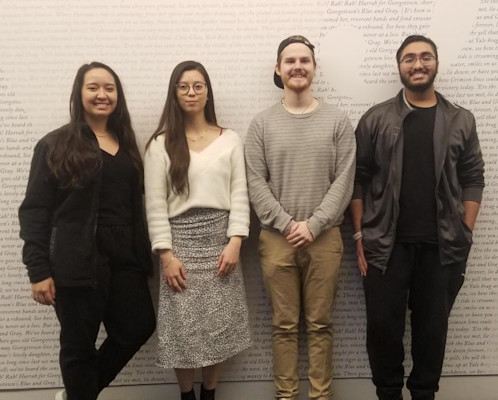Zane Hasnain, 20

Zane first got interested in programming in middle school when he started making games in Unity, but when he went to high school and found a lackluster computer science program, he took initiative and found programs outside of school. He joined the Technology Student Association, an engineering program that annually hosts nationwide competitions, and started a programming club at his school where he discovered hackathons while researching activities they could do. Soon after this discovery, he attended Hackital 2019 and had an amazing first experience spending 36 straight hours hacking, attending workshops, listening to keynotes, and meeting his fellow competitors. He has been hooked on hackathons since, having supported over 40 events as a hacker, mentor, judge, and workshop host.
Growing up as a first-generation low-income minority student, Zane lacked access to resources and communities to feed his interest in programming, so he understands the barriers that prevent people like himself from becoming high-level engineers or executives. He found the internet fascinating as a child, a place for people of all backgrounds to communicate, learn, and expand their worldviews, and the internet helped him gain confidence and meet some of his closest friends. Hackathons had a similar impact and gave Zane an avenue to pursue his tech interests, growing his programming knowledge and teaching important life lessons in optimism, determination, and resourcefulness from seeing his projects through to the end whether they fail or are saved from collapse. Hackathons served as an equalizer, allowing him to gain knowledge, connections, and experience that he never could have otherwise.
Hoya Hacks sticks out in his mind as an event that helped him grow, as his team was full of beginners and non-CS majors and he guided them through the waves of joy at workshops and the frustration of unexpected challenges and debugging. On the event’s second day, Zane’s only ride home had to leave early, and he recalls being disheartened that he would leave his teammates at their first event with a bad experience. Just as Zane was about to leave, he got a message from an MLH representative that went to his university offering a ride back to campus; He was elated and made it back in time to finish the project with his team. Despite the difficulties they faced and not winning at the event, Zane’s teammates were amazed by the hackathon experience. The experience motivated Zane to focus on leadership, and he wanted to give back to the hacker community so he became an event organizer.
Working at gender-focused hackathons like Technica and HackViolet, Zane helps develop diversity and inclusivity initiatives in hopes of spreading them to all hackathons, making the entire ecosystem more welcoming to people of all backgrounds. Zane is also planning to host his own hackathon that targets first-generation students: FirstGenHacks! If you are interested in collaborating, feel free to reach out to him via LinkedIn. While the event is still in its planning stages, Zane is dedicated to creating more inclusive events that send a message to students of all majors and backgrounds: Hackathons are for everyone!
As an organizer, Zane is always working to improve the hackathon experience for attendees, and he even helps consult other hackathon organizers to improve their events. One time the organizing team for a hackathon reached out to Zane after hearing about his positive impact on another hackathon, so he joined the event as a mentor, judge, and workshop host. Some attendees experienced rude comments, trolls, and were even insulted by another hackathon’s organizer. Zane had never seen such behavior in all the hackathons he had attended, so he brought it to the attention of the event’s organizing team. The team’s members were all women from underrepresented backgrounds which Zane loved, and after the event, he scheduled a call with them to discuss ways to make future events have a more welcoming, inclusive, and positive environment. They talked about insights from the event and common challenges that virtual hackathons face, as well as acknowledging the strengths and highlights of the largely spectacular event. Zane maintains open communication with the organizers, giving advice when needed to help them overcome challenges in shifting to virtual events, and listening to the unique problems that the all-female-minority team has to help create inclusive solutions.
At Cypher VI, Zane created his favorite hackathon project, Last Minute Meals. The project tackles the issue of food waste and sustainability by keeping track of the user’s “virtual fridge” based on the items on their receipt, giving them reminders for when items are about to go bad. The app gives advice on effective recycling based on the foods’ packaging, and, given how many people are learning to cook during the pandemic, it recommends dishes to users with items already in their fridge based on their dietary preferences. Zane loved this project because many people are just as busy if not more so right now, with tighter spending budgets and fewer options to eat out, so its ability to help people save money and reduce their grocery waste serves as a useful tool for their daily lives. It also allows them to easily incorporate eco-friendly habits such as composting into their lives, and is a product that Zane as a home cook finds extremely useful.
Hackathons have taught Zane many skills that prepare him for his career and professional life as a whole. Learning cutting-edge technologies such as Machine Learning, Artificial Intelligence and Virtual Reality are more practical skills than the theory-based education at university. Aside from technical experiences, the challenge of coming up with an idea for a project then learning new languages and tech on the spot to build a prototype is an amazing learning experience that hones creative and improvisational skills. Networking at events, engaging with judges, and talking to other attendees with similar interests has helped improve Zane’s communication skills as well as expanded his worldviews in ways that impact his everyday life and work ethic.
Quick Facts

Zane Hasnain, 20

Zane first got interested in programming in middle school when he started making games in Unity, but when he went to high school and found a lackluster computer science program, he took initiative and found programs outside of school. He joined the Technology Student Association, an engineering program that annually hosts nationwide competitions, and started a programming club at his school where he discovered hackathons while researching activities they could do. Soon after this discovery, he attended Hackital 2019 and had an amazing first experience spending 36 straight hours hacking, attending workshops, listening to keynotes, and meeting his fellow competitors. He has been hooked on hackathons since, having supported over 40 events as a hacker, mentor, judge, and workshop host.
Growing up as a first-generation low-income minority student, Zane lacked access to resources and communities to feed his interest in programming, so he understands the barriers that prevent people like himself from becoming high-level engineers or executives. He found the internet fascinating as a child, a place for people of all backgrounds to communicate, learn, and expand their worldviews, and the internet helped him gain confidence and meet some of his closest friends. Hackathons had a similar impact and gave Zane an avenue to pursue his tech interests, growing his programming knowledge and teaching important life lessons in optimism, determination, and resourcefulness from seeing his projects through to the end whether they fail or are saved from collapse. Hackathons served as an equalizer, allowing him to gain knowledge, connections, and experience that he never could have otherwise.
Hoya Hacks sticks out in his mind as an event that helped him grow, as his team was full of beginners and non-CS majors and he guided them through the waves of joy at workshops and the frustration of unexpected challenges and debugging. On the event’s second day, Zane’s only ride home had to leave early, and he recalls being disheartened that he would leave his teammates at their first event with a bad experience. Just as Zane was about to leave, he got a message from an MLH representative that went to his university offering a ride back to campus; He was elated and made it back in time to finish the project with his team. Despite the difficulties they faced and not winning at the event, Zane’s teammates were amazed by the hackathon experience. The experience motivated Zane to focus on leadership, and he wanted to give back to the hacker community so he became an event organizer.
Working at gender-focused hackathons like Technica and HackViolet, Zane helps develop diversity and inclusivity initiatives in hopes of spreading them to all hackathons, making the entire ecosystem more welcoming to people of all backgrounds. Zane is also planning to host his own hackathon that targets first-generation students: FirstGenHacks! If you are interested in collaborating, feel free to reach out to him via LinkedIn. While the event is still in its planning stages, Zane is dedicated to creating more inclusive events that send a message to students of all majors and backgrounds: Hackathons are for everyone!
As an organizer, Zane is always working to improve the hackathon experience for attendees, and he even helps consult other hackathon organizers to improve their events. One time the organizing team for a hackathon reached out to Zane after hearing about his positive impact on another hackathon, so he joined the event as a mentor, judge, and workshop host. Some attendees experienced rude comments, trolls, and were even insulted by another hackathon’s organizer. Zane had never seen such behavior in all the hackathons he had attended, so he brought it to the attention of the event’s organizing team. The team’s members were all women from underrepresented backgrounds which Zane loved, and after the event, he scheduled a call with them to discuss ways to make future events have a more welcoming, inclusive, and positive environment. They talked about insights from the event and common challenges that virtual hackathons face, as well as acknowledging the strengths and highlights of the largely spectacular event. Zane maintains open communication with the organizers, giving advice when needed to help them overcome challenges in shifting to virtual events, and listening to the unique problems that the all-female-minority team has to help create inclusive solutions.
At Cypher VI, Zane created his favorite hackathon project, Last Minute Meals. The project tackles the issue of food waste and sustainability by keeping track of the user’s “virtual fridge” based on the items on their receipt, giving them reminders for when items are about to go bad. The app gives advice on effective recycling based on the foods’ packaging, and, given how many people are learning to cook during the pandemic, it recommends dishes to users with items already in their fridge based on their dietary preferences. Zane loved this project because many people are just as busy if not more so right now, with tighter spending budgets and fewer options to eat out, so its ability to help people save money and reduce their grocery waste serves as a useful tool for their daily lives. It also allows them to easily incorporate eco-friendly habits such as composting into their lives, and is a product that Zane as a home cook finds extremely useful.
Hackathons have taught Zane many skills that prepare him for his career and professional life as a whole. Learning cutting-edge technologies such as Machine Learning, Artificial Intelligence and Virtual Reality are more practical skills than the theory-based education at university. Aside from technical experiences, the challenge of coming up with an idea for a project then learning new languages and tech on the spot to build a prototype is an amazing learning experience that hones creative and improvisational skills. Networking at events, engaging with judges, and talking to other attendees with similar interests has helped improve Zane’s communication skills as well as expanded his worldviews in ways that impact his everyday life and work ethic.
Quick Facts




